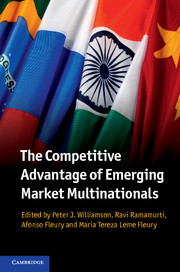Book contents
- Frontmatter
- Contents
- List of figures
- List of tables
- Notes on contributors
- Acknowledgements
- Introduction
- Part I Innovation and competitive advantage
- 1 Innovation by Brazilian EMNEs
- 2 Innovation by Russian EMNEs
- 3 Innovation by Indian EMNEs
- 4 Innovation by Chinese EMNEs
- Commentaries on Part I
- Part II Value-chain configuration and competitive advantage
- Commentaries on Part II
- Part III Mergers and acquisitions and competitive advantage
- Commentaries on Part III
- References
- Index
2 - Innovation by Russian EMNEs
Published online by Cambridge University Press: 05 April 2013
- Frontmatter
- Contents
- List of figures
- List of tables
- Notes on contributors
- Acknowledgements
- Introduction
- Part I Innovation and competitive advantage
- 1 Innovation by Brazilian EMNEs
- 2 Innovation by Russian EMNEs
- 3 Innovation by Indian EMNEs
- 4 Innovation by Chinese EMNEs
- Commentaries on Part I
- Part II Value-chain configuration and competitive advantage
- Commentaries on Part II
- Part III Mergers and acquisitions and competitive advantage
- Commentaries on Part III
- References
- Index
Summary
Introduction
Russian firms face a clear quandary in terms of innovation and value creation due to their inability to effectively create new applications based on the rich human resource base inherited from the Soviet past. Unlike countries like China, India, Brazil, Singapore, Taiwan and other emerging markets, Russia lacks the economic incentive scheme to translate new discoveries into viable products and services. The tradition of a high level of concentration of research activities in specialised public and private research and development (R&D) centres separates new technology developments from market forces and customer needs. According to a recent OECD Innovation Policy Review (2011) Russia still suffers from a system where innovation is not firm-specific and the lack of competition undermines the economic incentives for innovation. Russia also faces an ageing cohort of scientists and increasing global competition for both innovation and talent, and lacks market orientation in firm-level innovation investments. In this chapter we explore how Russian multinational corporations (MNCs) address their innovation needs, provide an overview of how they operate within the Russian innovation system and examine case studies of Russian firms which have broken out of the bounds of their domestic system and utilised innovation-driven strategies in their firm-level internationalisation.
Innovation is universally recognised as a competitive advantage and a key driver of growth of multinational companies. Presently, innovation is not limited to Western multinationals, emerging multinational companies are realising the strategic value of innovation too. Among emerging multinationals, Russian companies represent an interesting case. Russia inherited the Soviet science and technology (S&T) complex that enjoyed success in many technological domains. However, the institutional collapse after the break-up of the Soviet Union had a profound effect on innovation, science and technology. Since the early 2000s the Russian economy has been widely acknowledged to be dependent on natural resource production.
- Type
- Chapter
- Information
- Publisher: Cambridge University PressPrint publication year: 2013
- 3
- Cited by



